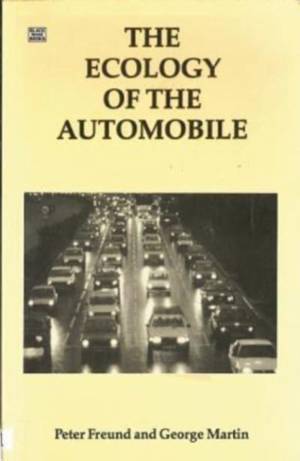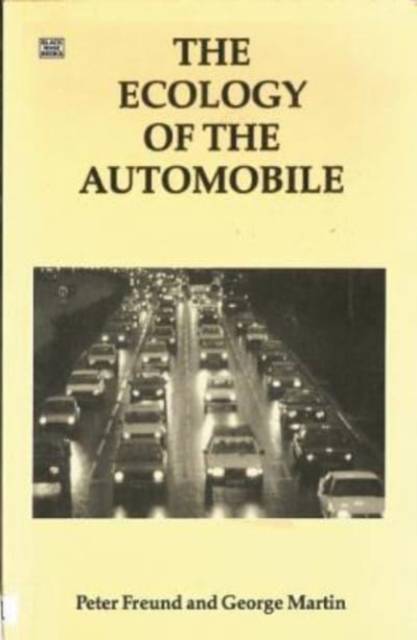
- Retrait gratuit dans votre magasin Club
- 7.000.000 titres dans notre catalogue
- Payer en toute sécurité
- Toujours un magasin près de chez vous
- Retrait gratuit dans votre magasin Club
- 7.000.0000 titres dans notre catalogue
- Payer en toute sécurité
- Toujours un magasin près de chez vous
Description
Carefully researched, The Ecology of the Automobile is a classic that examines the central role that auto production and consumption have played in the 20th Century. More than seventeen million people have been killed on roads since the automobile first appeared. (1993) An incalculable number have been seriously hurt. In the future, half the world is likely to be run over in a terminal squabble for oil. For today we are possessed by a mindless monster which threatens the planet itself. Considering the widespread impact of the auto on many contemporary societies, it is surprising how little attention its social and political dimensions receive - even from ecologically oriented thinkers. This, despite the fact that vehicular traffic is viewed as a major problem. In this original book, authors Freund and Martin examine the central role that auto production and consumption have played in the twentieth century: as a technological system with major impacts on public policy, land use, cultural patterns, social relations, community, natural resources, environmental quality and options for spatial mobility. The overuse and misuse that has caused auto saturation and the costs of auto-centred transport are identified. Individualist and consumerist ideologies that tend to obscure the problems of auto hegemony, including environmental and public health effects, are vigorously questioned. "For policymakers and others interested in a critical appraisal of auto dependence."--Earthwatch "An excellent read for those interested in the environmental impacts and social role of the automobile. Accessible and carefully researched. We need more books like this."--Earthkeeper Table of Contents Preface
Introduction: the Parameters of Auto-Centred Transport Systems Part One: Auto Centred Transport as a Social Problem
1. The Consumption Intensity of Auto-Centred Transport
2. The Ecological nand Health Costs of Auto-Centred Transport
3. The Social Inequalities of Auto-Centred Transport
4, The Globalization of Auto Hegemony Part 2: Deconstructing Auto Hegemony
5. The Ideology of Automobility
6. The Phenomenology of Automobility
7. Auto Space Part 3: Politics and Alternatives
8. The Politics of Transport Policy
9. Modifying Auto-Centred Transport
10. Social Change Bibliography
Name Index
Subject Index Peter Freund holds a Ph.D. from the New School of Social Research, New York, and teaches at Montclair State, New Jersey. He is co-author of Health, Illness and the Social Body and author of the Civilized Body. George Martin holds a Ph.D. from the University of Chicago and also teaches at Montclair State. He is co-author of The Welfare Industry and Social Welfare in Society, and author of Social Policy in the Welfare State. 1993: 213 pages, Preface, Introduction, Bibliography, Name Index, Subject Index.
Introduction: the Parameters of Auto-Centred Transport Systems Part One: Auto Centred Transport as a Social Problem
1. The Consumption Intensity of Auto-Centred Transport
2. The Ecological nand Health Costs of Auto-Centred Transport
3. The Social Inequalities of Auto-Centred Transport
4, The Globalization of Auto Hegemony Part 2: Deconstructing Auto Hegemony
5. The Ideology of Automobility
6. The Phenomenology of Automobility
7. Auto Space Part 3: Politics and Alternatives
8. The Politics of Transport Policy
9. Modifying Auto-Centred Transport
10. Social Change Bibliography
Name Index
Subject Index Peter Freund holds a Ph.D. from the New School of Social Research, New York, and teaches at Montclair State, New Jersey. He is co-author of Health, Illness and the Social Body and author of the Civilized Body. George Martin holds a Ph.D. from the University of Chicago and also teaches at Montclair State. He is co-author of The Welfare Industry and Social Welfare in Society, and author of Social Policy in the Welfare State. 1993: 213 pages, Preface, Introduction, Bibliography, Name Index, Subject Index.
Spécifications
Parties prenantes
- Auteur(s) :
- Editeur:
Contenu
- Nombre de pages :
- 220
- Langue:
- Anglais
Caractéristiques
- EAN:
- 9781895431827
- Date de parution :
- 03-12-93
- Format:
- Livre broché
- Format numérique:
- Trade paperback (VS)
- Dimensions :
- 140 mm x 216 mm
- Poids :
- 219 g

Les avis
Nous publions uniquement les avis qui respectent les conditions requises. Consultez nos conditions pour les avis.






